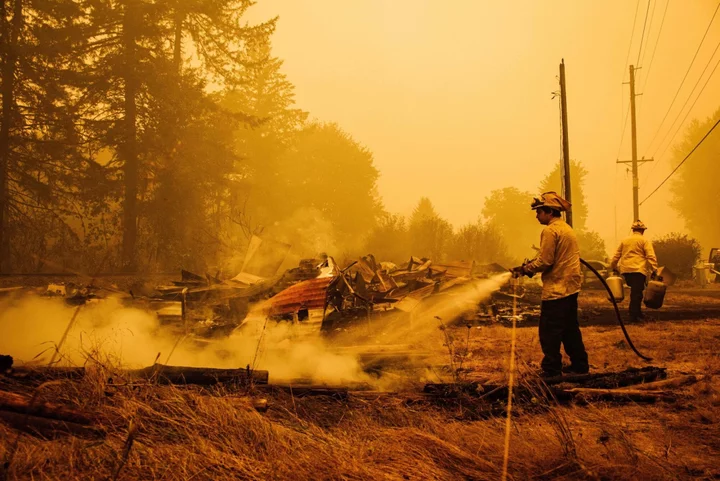A Berkshire Hathaway Inc. energy unit’s $87 million hit this week in a first-of-its-kind trial blaming the company for massive wildfires in Oregon is poised to grow into the billions when thousands of additional victims pursue claims for damages.
PacifiCorp was found grossly negligent and reckless by a jury on Monday for failing to prevent four fires that burned about 2,500 properties when power lines toppled during a windstorm on Labor Day in 2020. Jurors in state court in Portland added punitive damages Wednesday after a lawyer for 17 property owners argued that the company destroyed evidence and offered “no accountability” for its actions.
The exact amounts to be paid out to about 5,000 residents and business owners will be determined in a later proceeding — and appeals that the company has vowed to pursue may take years to resolve. PacifiCorp said it’s “confident we will prevail” on appeal.
PacifiCorp’s bonds were among the biggest decliners in investment-grade secondary trading Wednesday. Its 5.5% notes due in 2054 widened 6 basis points to 178 basis points more than Treasuries, according to Trace pricing data. Berkshire’s Class B shares showed little movement in after-hours trading.
Seven-Week Trial
The seven-week trial marked the first class-action case against a major utility to go to a jury following a series of catastrophic fires on the US West Coast in recent years touched off by historic droughts and searing heat exacerbated by climate change.
PacifiCorp touts itself as the largest grid operator in the western US, serving 2 million customers in six states. The 2020 fires in Oregon were the state’s most expensive disaster ever. Beyond the Portland case, the company may face another trial over a 2020 fire in a different Oregon community, as well as litigation over a 2022 blaze near the California border that killed four people.
Lawyers for the victims hailed this week’s outcome as “historic,” saying that when actual damages are calculated for all the remaining survivors, and portions of those awards are doubled under Oregon law and then supplemented with punitive damages, it stands to be “the largest civil jury verdict in Oregon history.”
The jury determined that the amount of punitive damages should be one-quarter of whatever is eventually awarded to compensate people for physical losses and emotional suffering.
$11 Billion
PacifiCorp argued to the jury that it could hypothetically face $11 billion in total damages — more than the company’s $10.7 billion net worth.
The final outcome will depend heavily on the individual damages sought by remaining class members. While the 17 victims in the initial trial stand to collect an average of $5 million, largely for emotional distress and also for losses of homes and businesses, about 1,000 of the parcels burned in the fires are vacant lots that won’t qualify for significant damages, according to evidence introduced at trial.
CreditSights utility analyst Andy DeVries said in a June 12 research note that a maximum payout of $1.6 billion projected by the PacifiCorp plaintiffs’ lawyers before the trial would be a “fairly large hit” to the company’s funds from operations to total debt ratio, “but still manageable.”
He said in an interview that the company’s loss in court may encourage more lawsuits. “You see this huge multibillion headline and people start wanting a piece of that pie,” he said.
Red-Flag Warnings
A key issue in the trial was whether PacifiCorp could and should have deactivated power lines in its service areas after weather forecasters issued red-flag warnings about high winds combining with hot, dry conditions to create a high fire danger.
Lawyers for the property owners alleged the company should have foreseen that the windstorm that arrived on Sept. 7, 2020 would knock down power lines, sparking fires and widespread devastation.
The company argued that the lawsuit was filed in hindsight and that it’s overly simplistic to blame the utility’s decision-making amid the complexities of climate change. It also contended there wasn’t enough evidence linking its equipment to the fires.
In a bid to head off punitive damages, PacifiCorp told the jury it could have done more to prevent the disaster but that its employees didn’t show “reckless and outrageous indifference” to the risk of wildfires.
“Escalating climate change, challenging state and federal forest management, and population growth in the wildland-urban interface are substantial factors contributing to growing wildfire risk,” the company said in a statement. “These systemic issues affect all Oregonians and are larger than any single utility.”
How Global Warming Makes Extreme Weather More Likely: QuickTake
DeVries said he expects the utility industry will back any appeal by PacifiCorp challenging the finding it was negligent for not turning off the power.
“It would be game changing for Pacific Northwest and Rockies utilities if failing to de-energize lines equals negligence,” he said.
The case is James v. PacifiCorp, 20CV33885, Oregon Circuit Court, County of Multnomah (Portland).
--With assistance from Joel Rosenblatt and Natalie Harrison.

